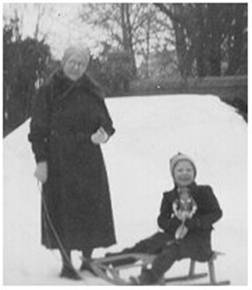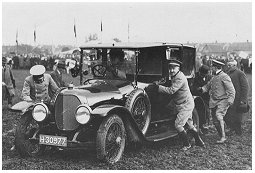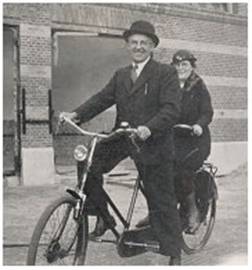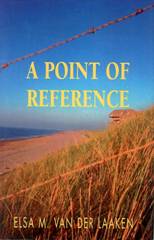
|
Copyright 2008 - All Rights Reserved |



|
Home I About the Author I News I A Point of Reference I 1960 Destination Israel vanderlaaken.com |

|
FOOD IN A LION'S DEN There was hope and expectation in the air. "The war will be over this fall," we whispered to each other while giving an inconspicuous "V" sign with our fingers. Meanwhile food was so scarce, that we lived entirely from the small Palace plot. Hungry people were scavenging for food-rests everywhere, begging and scanning the streets. Sick people, or expecting mothers, did not get extra food stamps anymore. It seemed that everything was organized in such a way that people did not starve completely, but were kept just alive. Workers in Dutch industries, slaving away long hours for Nazi interests, slowed down the production even more. This made the Nazis grumble that "those stupid Dutch never did anything efficiently." But to fool the enemy was the only fun there was. Humor was never far away from harsh reality. After a good laugh you felt that you could go on. The limping Seyss-Inquart got the nickname of Hinkelepink" (Hoppetyhop). "Why?" "He limps because he has a swastika in his pants!" The list of nicknames for Hitler was endless. "Do you know Hitler's real first name?" "No, no, not Adolf, but Winnetou-tie-toch-niet," was the whispered response. It meant, "Winning he will not." And this was double fun, because the phrase mentioned Winnetou as well, a brave character from forbidden adventure stories. The Nazi soldiers continued to transport large quantities of food and raw materials to Germany. Only a 6-month's supply stayed in Holland. "Everything is stolen, including our men," were the tearful comments heard. Medical doctors protested again for the hungry and sick population, but this time in vain. And Seyss-Inquart's high society in the center of The Hague continued living the high life as if nothing could endanger it. Dr. Bockamp received an invitation for dinner at the restaurant of Hotel "Des Indes." Not able to go, and thinking about the food scarcity around him, he gave the tickets to my father so that my parents could have an outing and a good meal in the restaurant. My father had no choice but to accept the kind gesture. He pondered whether to go or not, and how to enter the classy restaurant where only high Nazi officials met. At the time, Hotel Des Indes was the most luxurious and elegant hotel in The Hague. The name spelled already the colonial and oriental atmosphere: "Hotel of the Indies." It was a popular meeting place for visitors from the Far East, especially from Indonesia, or for ex-patriots returning home. Here you could find people with similar international life experience, who would talk longingly about the East, and taste favorite oriental dishes again. The very polite male staff was dressed in Indonesian attire, usually a batik sarong wrapped around the waist, a short white jacket and a typical headdress. But Hotel Des Indes with its exclusive restaurant was also taken over by the German High Command. The restaurant was now a meeting place for educated high officials from the Third Reich. Dutch waiters, who were too old to be sent to German work camps, replaced the colorful Indonesian waiters. My father imagined at length the problems he would face if he would go with my mother to this exclusive restaurant. If he would enter with my mother, and be seen, he would get the label of traitor and she would get the label of Nazi. Life was already difficult enough without these injustices added to it. I really don't know the prelude to my father's decision not to take my mother but to take me to this restaurant. He must have discussed it in depth with her. After all, I was an innocent child and could not get the label of traitor or Nazi stuck on me. And my father liked the challenge to see the famous place inside and discover who was there. It must have been difficult to come to this decision, and for my mother to let me go. But she blindly trusted my father and knew that he had wriggled himself out of difficult situations before. We walked to the restaurant, which was only a fifteen-minute walk from our home. It was late afternoon and rather quiet in the streets. We would try to return before curfew. I held on to my father's hand. We arrived at the hotel Des Indes. Over the entrance hung a large round sunshade. To me the entrance of the restaurant looked like an open mouth with a protruding upper lip. It did not help that my father said softly, "Now we're entering the lion's den." I gripped his hand tightly, because I knew exactly what he meant. In the hallway stood a tall blond gray-clad soldier who jumped to attention while clicking his heels together. "Heil Hitler," he said loudly with his arm held high. I gripped my father's hand even tighter and he responded with a similar grip. It was as if we were encouraging each other. "Good-evening, sir," said my father in Dutch, gripping my hand and showing the invitation with the other hand. He never lifted his arm to return the hated Nazi greeting. When his identity papers were checked, we were allowed to continue our odyssey. I think we stood rather dazed at the entrance of the famous restaurant. The first hurdle we had successfully passed, but what would be the next? Inside we saw old waiters running around busily. The headwaiter came to us and my father explained his situation in very rapid Dutch. We were given a table far away from the loud German crowd. I gazed in wonder at this fantastic place. The dark wooden wainscot, the drapes and all the tables set with white china and white tablecloths. I stared for a long time at the small palm-trees in the painted Chinese vases. They stood on dark wooden supports that had crooked legs. They seemed to be out of place here, but they were beautiful and I had never seen such palms or such enormous plant pots before. The noisy men far away were drinking, smoking and laughing with their German or Dutch girlfriends. I heard the soft tinkle of their wineglasses and thought that they had everything. My father was visibly uncomfortable in this place, but he observed everything as keenly as I did. A small Dutch waiter appeared. My father explained again his position and asked about the menu. "What do you have here to eat," he said, with a stress on "here." He also asked who came in this restaurant regularly and who was here now. The waiter explained the menu elaborately and gave information at the same time. Between the servings more information was passed along. It seemed that they were acting out a play, but I did not really listen and continued gazing around. I can only remember that we started the meal with creamy white soup that had a salty taste. I ate gingerly because I was on edge all the time. I cannot remember the rest of the meal, but I must have eaten more than the soup, because my father ate heartily and prodded me on to eat. His calmness reassured me, but the scenes I was taking in made me fuller than the food on the elegantly set table. I hated the decoration that hung from the ceiling at the far end of the restaurant. Three large banners hung there as if to wipe out the history of hotel Des Indes and the civilization of The Hague. The red banners had white circles on them with the swastika inside. My father sat with his back to them but I faced them head on. My pious schoolteacher had explained that the swastika was a symbol of evil. It was really a deformed cross of Jesus inside the round shape of the world, she said. The red of the banners was all the blood given by honest and courageous people who had died to fight this evil. It was a proper decoration for a lion's den, I thought. The banners were blowing in the evening breeze. I wished that they would blow away through the open windows, and preferred to watch the waving palms in their large painted Chinese pots. Time never seemed to pass. I wanted to get away as fast as I could, but father remained composed. We finally finished, thanked the waiter, stood up and walked slowly through the hallway. "Did you enjoy your stay?" asked the blond gray-clad soldier. "Yes," said my father, "it was good." "Heil Hitler," the soldier shouted again, clicking his boots. But we were already out of this den of discomfort and never looked back. Slowly we walked home, each engrossed in own thoughts. We arrived just before the curfew siren sounded. Mother stood behind the door when we came in and embraced us tightly with tears in her eyes. I was so very happy to be safely home with my parents again. I never told anyone at school that I had been in hotel Des Indes. I also never complained again to my mother about the strange nutritious meals she invented from the inferior food we still could buy, but which didn't fill us up anymore. The greatest and most satisfying soul food arrived on June 4th, 1944 when the Allies marched into the city of Rome in Italy. Two days later they landed on the coast of Normandy in France! Normandy was a complete surprise for all of us because it was so very close to Holland! Now this horrible war will come to an end. Soon our liberators will march into the city and give us our freedom back. |
|
An Excerpt from A Point of Reference |